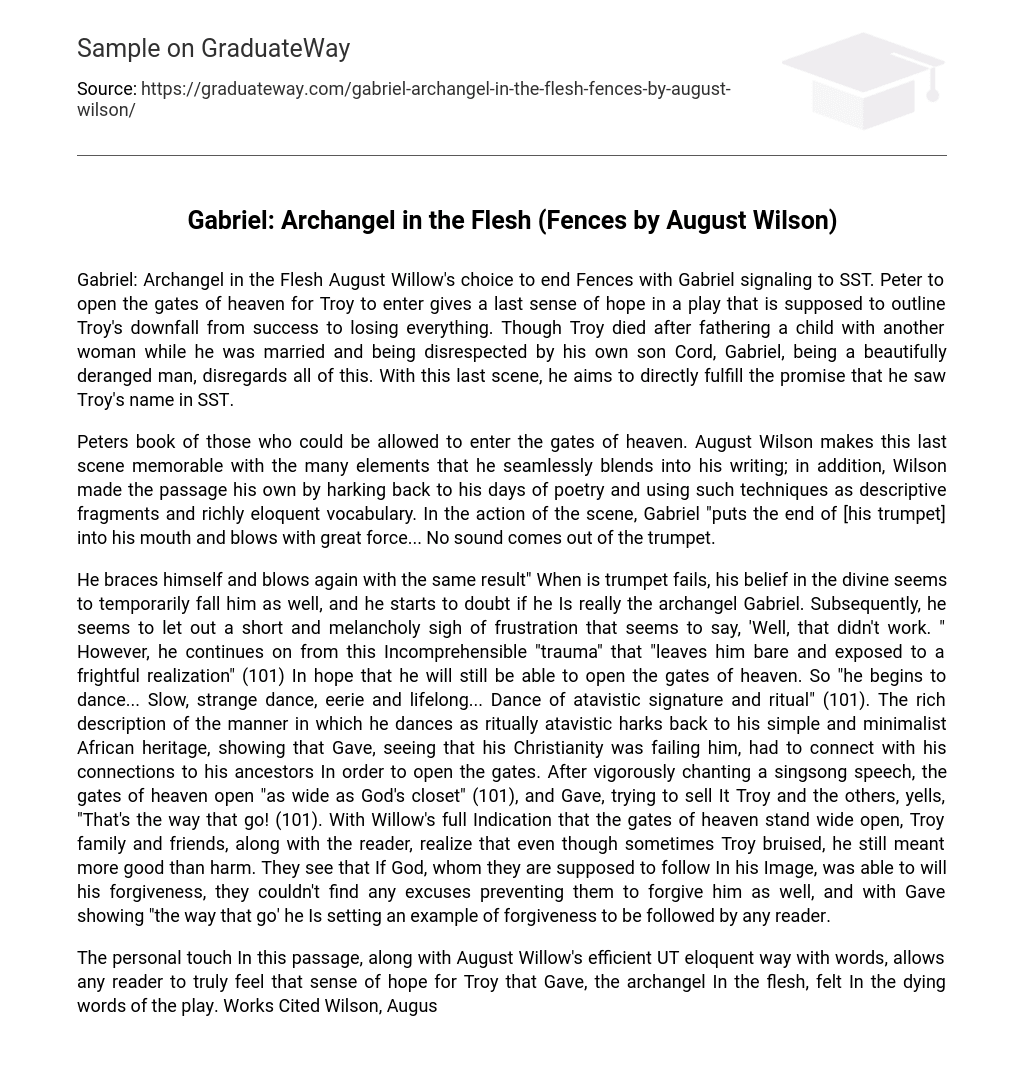Gabriel: Archangel in the Flesh August Willow’s choice to end Fences with Gabriel signaling to SST. Peter to open the gates of heaven for Troy to enter gives a last sense of hope in a play that is supposed to outline Troy’s downfall from success to losing everything. Though Troy died after fathering a child with another woman while he was married and being disrespected by his own son Cord, Gabriel, being a beautifully deranged man, disregards all of this. With this last scene, he aims to directly fulfill the promise that he saw Troy’s name in SST.
Peters book of those who could be allowed to enter the gates of heaven. August Wilson makes this last scene memorable with the many elements that he seamlessly blends into his writing; in addition, Wilson made the passage his own by harking back to his days of poetry and using such techniques as descriptive fragments and richly eloquent vocabulary. In the action of the scene, Gabriel “puts the end of [his trumpet] into his mouth and blows with great force… No sound comes out of the trumpet.
He braces himself and blows again with the same result” When is trumpet fails, his belief in the divine seems to temporarily fall him as well, and he starts to doubt if he Is really the archangel Gabriel. Subsequently, he seems to let out a short and melancholy sigh of frustration that seems to say, ‘Well, that didn’t work. ” However, he continues on from this Incomprehensible “trauma” that “leaves him bare and exposed to a frightful realization” (101) In hope that he will still be able to open the gates of heaven. So “he begins to dance… Slow, strange dance, eerie and lifelong… Dance of atavistic signature and ritual” (101). The rich description of the manner in which he dances as ritually atavistic harks back to his simple and minimalist African heritage, showing that Gave, seeing that his Christianity was failing him, had to connect with his connections to his ancestors In order to open the gates. After vigorously chanting a singsong speech, the gates of heaven open “as wide as God’s closet” (101), and Gave, trying to sell It Troy and the others, yells, “That’s the way that go! (101). With Willow’s full Indication that the gates of heaven stand wide open, Troy family and friends, along with the reader, realize that even though sometimes Troy bruised, he still meant more good than harm. They see that If God, whom they are supposed to follow In his Image, was able to will his forgiveness, they couldn’t find any excuses preventing them to forgive him as well, and with Gave showing “the way that go’ he Is setting an example of forgiveness to be followed by any reader.
The personal touch In this passage, along with August Willow’s efficient UT eloquent way with words, allows any reader to truly feel that sense of hope for Troy that Gave, the archangel In the flesh, felt In the dying words of the play. Works Cited Wilson, August. Fences. New York: Samuel French, 2010. Print. Gabriel: Archangel in the Flesh (Fences by August Wilson) By Josh-Noon SST. Pewter’s book of those who could be allowed to enter the gates of heaven. August his trumpet fails, his belief in the divine seems to temporarily fail him as well, and he starts to doubt if he is really the archangel Gabriel.
Subsequently, he seems to let out short and melancholy sigh of frustration that seems to say, “Well, that didn’t work. ” However, he continues on from this incomprehensible “trauma” that “leaves him bare and exposed to a frightful realization” (101) in hope that he will still be able to open lifesaving… A dance of atavistic signature and ritual” (101). The rich description of the failing him, had to connect with his connections to his ancestors in order to open the wide as God’s closet” (101), and Gave, trying to sell it Troy and the others, yells, “That’s the way that go! (101). With Willow’s full indication that the gates of heaven stand wide open, Troy’s family and friends, along with the reader, realize that even though sometimes Troy bruised, he still meant more good than harm. They see that if God, whom they are supposed to follow in his image, was able to will his forgiveness, they showing “the way that go’ he is setting an example of forgiveness to be followed by any reader. The personal touch in this passage, along with August Willow’s efficient Troy that Gave, the archangel in the flesh, felt in the dying words of the play.





